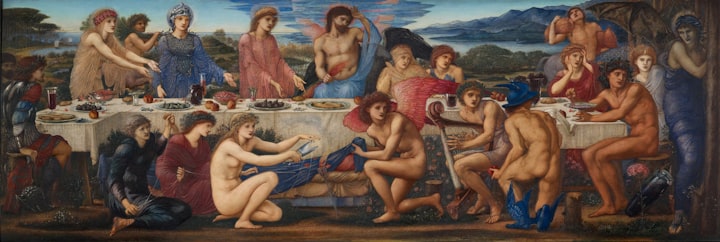Mythology
The lyre of Lyra is the harp carried by Orpheus, the musician. Orpheus' father was Apollo

Orpheus (those who have seen the Saints must remember this story) Silver Saints
The lyre of Lyra is the harp carried by Orpheus, the musician. Orpheus' father was Apollo, the god of the sun and music, and his mother was Calliope, the goddess of song, so it was only natural that Orpheus became the musical genius of Greece. Legend has it that when he sang while playing the harp, not only people but also animals in the mountains were enchanted and the rocks became soft. Orpheus fell in love with Eurydice (Eurydice), and the two received the blessing of the gods and married, but the happy newlywed life did not last long, one day Eurydice and her friends walking in the meadow, the foot was suddenly bitten by a poisonous snake, and died. Orpheus was devastated, thinking about how to bring Yulidai back to life, and finally had to take the harp to the netherworld, regardless of everything. The fierce gatekeeper Cerberus and the indifferent ferryman of the river Styx were moved by Orpheus' lament and let him pass through as a living man. Orpheus comes to Pluto, the king of the underworld, playing his harp and singing his heart out, asking the king to let his wife return to the earth (the underworld) again. Pluto refused coldly at first, but was moved by his enthusiasm and agreed to his request. As a condition for the return of his wife, Puruṣa instructed Orpheus not to look back before leaving the underworld. Orpheus was overjoyed and led Eurydice to the earth. The way underground was long, and Orpheus grew worried. Why couldn't he hear Uriadne's footsteps? When he saw the light on the ground, he couldn't help but turn around, and in an instant, Yulitai only let out a soft cry and was pulled back into the underworld. Orpheus frantically chased after his wife, but this time even the ferryman of the river Styx would not let him cross. Orpheus played his harp in despair and wandered through the hills and fields. Chasing Eurydice's phantom, he was not close to women, and he incurred the hatred of the Thracian women, who tortured him to death on the night of the feast of the god of wine and then dumped his body in the river. Orpheus' harp, playing a sad tune alone, drifted down the river and soon crossed the sea to the island of Lesbos, where it was picked up by the islanders and dedicated to the temple of Apollo, who, mourning the death of his beloved son, took it to the sky and added it to the constellations.
The sound of his lyre can make the saint intoxicated by the sound of the lyre, and this sound is very aggressive.
If a golden saint hears his voice before he makes a move, he will still be charmed.
Therefore, his strength is no longer below the Golden Saints
The story of Orpheus comes from a touching ancient Greek myth, Orpheus is Orpheus; Eurydice is Eurydice.
Orpheus was born to Calliope, one of the Nine Muses, and was able to use his beautiful singing voice and harp to make the rocks nod and the beasts tame. He participated in the expedition of the Argosian heroes to seize the Golden Fleece, and his musical talent helped them overcome many difficulties. He later married Eurydice, a forest nymph. Unfortunately, Eurydice was bitten by a poisonous snake and died one day. To bring his wife back to life, Orpheus went down to the ghastly underworld. With his beautiful music, he impressed the boatman of the river Cajun to help him cross the river and made the three-headed dog guarding the underworld hang down its head. Finally, Hades, the king of the underworld, was deeply moved and agreed to take his wife back to the afterlife but asked him not to look back at her before leaving the underworld. As a result, Orpheus could not resist looking back and thus lost his wife forever.
Afterward, he founded a new religion, calling the ancient sun god Helios Apollo the greatest god and goddess. Later, he angered Dionysus, the god of wine, and was torn apart by the mad daughters of the god of wine. They threw his head into the river Hebrus, but it still floated and sang on the water, and flowed into the sea (Mediterranean Sea), and came to the island of Lesbos, where it was placed in a cave, where it could prophesy day and night, and where people from far and near came to ask for oracles so that Apollo's gods' trust was unattended. Apollo stood on the head of Orpheus in anger and ordered him to shut up. From then on his head did not speak again. The body of Orpheus was sadly gathered up by the muses and buried at the foot of Mount Olympus, where the nightingale sings more sweetly than any other nightingale.






Comments
There are no comments for this story
Be the first to respond and start the conversation.